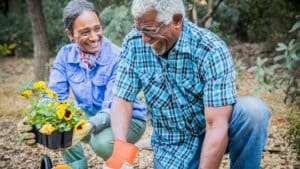
My house is on a hillside near the entrance to Wildcat Canyon Park, a beautiful regional park that stretches for miles. I love walking to the park and climbing what we call the ridges. On a clear day, you can reach what you think is the top, slightly out of breath, and turn around to view the San Francisco Bay and Golden Gate Bridge.
Then you turn ahead and realize you aren’t at the top, you’re facing yet another ridge that continues up, and you can see Mount Diablo in one direction and Mount Tamalpais in the other. That experience is what happens when we age.
In September 2022, I turned 70. Wow, it feels just like climbing up those ridges. I’ve been writing blogs for Sixty and Me since my mid-60. Recently, I heard from a reader, Jon Taber, a young man who’d read my blog Life After 60 May Just Be the Most Productive – It’s All About Perfect Timing. He requested an interview about ageism for his podcast, Audit Fun for people in the audit profession.
I’d been busy writing a book and hadn’t written blogs for a while. After researching ageism for the podcast, I decided it was vital information to share with Sixty and Me.
4 Things to Know About Ageism
Societal Stereotypes
Our society that worships youth promotes many misconceptions, stereotypes, and myths about aging. For example, seniors are often stereotyped as slow, weak, feeble, frail, and out of touch with the times, especially with technology. But, of course, you aren’t because you are reading this online!
A Global Challenge
A World Health Organization article entitled Ageism is a Global Challenge reports, “Every second person in the world is believed to hold ageist attitudes – leading to poorer physical and mental health and reduced quality of life for older persons, costing societies billions of dollars each year, according to a new United Nations report on ageism.”
Older Workers
Many of you continue to work part-time during your 60s. Some of my friends are working in their 70s and even their 80s. We don’t need research to remind us that older workers are often highly skilled and experienced.
According to the US Bureau of Labor Statistics, workers between 55-64 stay in their jobs more than three times more than those between 25-34. They often have a strong work ethic, arrive at work earlier, and are less likely to miss work.
Ageism Hurts Our Health
Whether we are working or not, ageism has been found to hurt our health. For example, an estimated 6.3 million cases of depression globally are estimated to be attributable to ageism. While it’s true that our memory is impacted as we age, we forget more when we worry about it.
But the worst part happens when we believe and internalize negative attitudes about aging. Ageism impacts our health in three different ways:
- Psychological: negative age stereotypes can exacerbate stress and depression.
- Behavioral: negative self-perceptions of aging predict worse health behavior, such as noncompliance with prescribed medications.
- Physiological: negative age stereotypes predict detrimental brain changes decades later, including the accumulation of plaques and tangles and a reduction in the size of the hippocampus.
What Can We Do About Ageism in Our Lives?
Neuroscientists are studying how stereotype threat, which is the fear of confirming a negative stereotype, harms seniors’ performance. In lab studies, researchers found that stereotypes can lead to slower walking and weaker grip strength for older adults.
Gerontology researcher Sarah Barber states, “Your attitude about aging is highly predictive of your aging outcomes,” she said. “Those who have positive attitudes about aging live longer, have a better memory function, and recover more easily from illnesses.”
Acting Against Ageism
So what can we do? We can work to counteract myths and misconceptions about aging and support policies and laws that address ageism. We can also work on our attitudes, increase confidence, enhance empathy, and engage in intergenerational activities. Ultimately, all these things will improve our health and the quality of our lives.
Reaching 70 has been an important milestone for me. I hope to follow this advice as I climb the ridges that lie ahead. You can listen to my recent interview here:
Resources
If you are working, here are a couple of great resources.
- National Council of Aging Tips – Job Skills CheckUp, to develop a plan to find job openings, build a professional network, prepare for job interviews, and more.
- Senior Community Service Employment Program (SCSEP) helps low-income older adults find work. It matches eligible applicants (age 55+) with paid, part-time training assignments for nonprofit organizations.
Let’s Have a Conversation:
Do you feel ageism in your life, or is this a concept you haven’t personally felt? How has ageism impacted you? Is ageism getting worse for you the older you get? What do you do to counteract the ageist stereotype?





